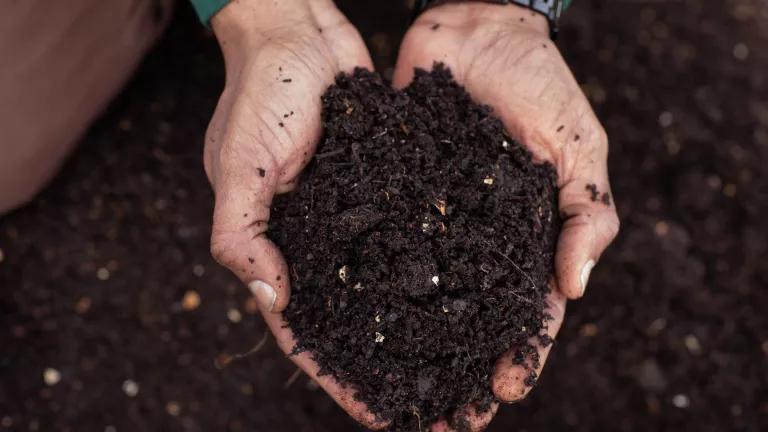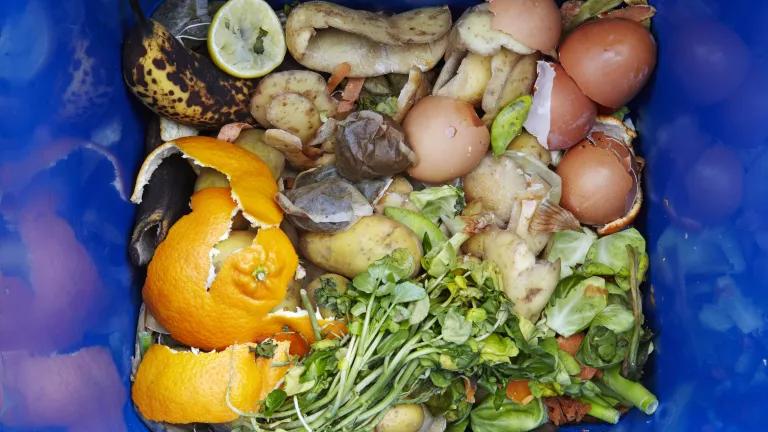USDA Grants for Food Waste Reduction
Composting and food waste reduction cooperative grants provide critical federal funding for cities and counties.

Compost at Baltimore Compost Collective
© MurmurRing/Miriam Doan
The U.S. Department of Agriculture (USDA) allocated $11.5 million for 38 composting and food waste reduction projects across 23 states this January. The Composting and Food Waste Reduction Cooperative Agreements (CFWR) provide critical funding for city and county initiatives, focusing on infrastructure and programs that ensure food consumption, surplus food redistribution, and food scraps recycling, providing community benefits like improved soil health. Past grants have supported cities, like Madison in ramping up composting options for residents and Philadelphia in engaging the business sector for waste reduction. To achieve our goal of diverting food scraps from the landfill, it is critical to have federal funding programs that can support infrastructure development at the state, regional, and local level.
The awarded projects cover a spectrum including regional composting infrastructure, food rescue, K-12 education, community composting networks, business engagement, and development of innovative markets for finished compost. Funding also supports staff time, planning, education and outreach. Priority was given to projects that promote collaboration across multiple local, regional and government partners. Through Food Matters, we work closely with city agencies and local groups to build this kind of cross-agency and non-profit collaboration, recognizing that effective food waste solutions require support at various levels and through partnerships across different sectors.
We are thrilled that several Food Matters partner cities received this funding.
- Denver, CO: Focuses on reducing food waste from the restaurant sector through prevention and rescue.
- Los Angeles, CA: Scales-up farmers’ market food waste drop-off and community composting programs in partnership with LA Compost.
- Hamilton County, OH: Creates a closed loop system to collect residential food waste, process compost, and use the finished compost on local urban agriculture sites.
- Cincinnati, OH: Expands composting collection and processing capacity across the city while bolstering food rescue and gleaning efforts.
- Chicago Public Schools: Develops a composting program for all schools in the district and provides education and outreach to schools on food waste reduction and environmental justice.
- Lane County, OR: Increases finished compost availability in historically underserved rural communities.
- Dane County, WI: Establishes five food waste drop-off sites and a dedicated position for implementation and education.
The USDA’s Office of Urban Agriculture has been critical in supporting these initiatives. Notably, there has been a substantial increase in grant availability since 2021, underscoring the growing demand and interest in addressing food waste reduction at a local and regional level. In line with recommendations from the Zero Food Waste Coalition, we would like to see USDA broaden the CFWR cooperative agreements by including states as eligible recipients and expanding the funding opportunities to include planning and implementation grants.
In addition to the CFWR grants, there are many additional federal funding opportunities that cities, states, and non-profit organizations utilize such as the Climate Pollution Reduction Grants and Solid Waste Infrastructure for Recycling grants. To aid people in exploring these funding solutions, NRDC and ReFED teamed up to develop a federal grants database. This resource streamlines the process of finding applicable grants so that entities can more easily access funding. Check out the database at the bottom of this page.
The CFWR program is a critical building block to help us achieve our national goal to halve food waste by 2030. We are excited to see the impacts of these projects and the continued growth of federal funding opportunities that can help to transform our food system.




